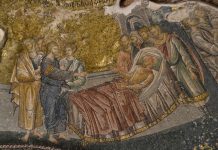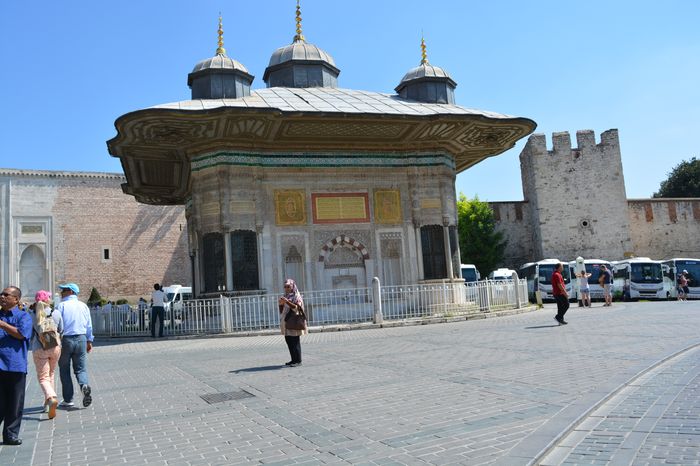Boethius knew many years of untroubled days in opulent surroundings. There, tranquil but for those few whispers of jealousy, we will leave Boethius content for now. Later his end and Theoderic’s will be bound up together in the unhappiest story of the age. For now we must look past his celebrity to see the rest of the Romans. There were, for example, Faustus, Faustus, and Festus, bearing the kind of names that the lower classes mock as indistinguishable, when everyone who was anyone could tell them apart instantly. They were of the old families, and the first two of the three were as dissimilar as their nicknames: Faustus the Black and Faustus the White.
Messala Corvinus
Faustus the Black claimed descent from the ancient Messala Corvinus and was known for his books, both those he owned and those he wrote. His distant and moderately poor relation Ennodius wrote poems about both, hoping Faustus the Black would think well of him. Faustus was consul in 490 and later master of the offices and quaestor at court, positions reserved for the elegant and loyal. He was a leading supporter of Pope Symmachus in the quarrels of these years, and so we last see him in office as praetorian prefect from 508 to 512, years when Theoderic was at the peak of his power.
Faustus the White had been prefect of the city—that is to say, governor of Rome itself—in the early 480s. He had his own seat inscribed at the Colosseum, and he would be prefect again in the 500s. A gentleman through and through, he demonstrated grace by having a statue of Minerva, that fine and not too toxic goddess of the old order, restored after it fell from a roof during a civil uprising. The 470s before Odoacer came to power were rough days, so Faustus’s restoration would have been an emblem of Odoacer’s and Theoderic’s long campaign to polish up the city tour packages bulgaria.
The third grandee, Festus, we have seen already, the most senior of the ex-consuls in all these years, having given the year his name in 472 and won his seat in the Colosseum afterward. By 490, he was already the senior surviving consul, when Theoderic sent him to Constantinople to represent his claims as the legitimate Roman ruler in Italy. Although Festus was unsuccessful then, he returned to Constantinople more successfully on the same mission in 497. He was loyal to Theoderic by choice rather than necessity, securely independent in his seniority. When he returned to Italy, he became the moving force behind the election of the alternative pope Laurentius. Rumor had it that Festus promised the emperor an end to schism Arian religion separated.
Emperor Zeno
Emperor Zeno signed a decree of church union called the Henotikon in 584, but that only made the divided parties dig in their heels, confirming the break between Rome and Constantinople. Pope Anastasius II (r. 496-498) was a promising candidate for leading a rapprochement and signing the Henotikon, but he died too soon, and so (the most common interpretation goes) Festus scattered bribes to ensure Laurentius’s election and did everything in his power to advance the Laurentian cause, to the point of giving Laurentius lifetime asylum on his estates when the tide went against them in the end. Festus managed this intrigue without losing Theoderic’s favor, and he is last seen as an object of worthy praise in 513, having by then become a man of very advanced years by Roman standards.
We should not think that these men were representative of their class. To an important extent, they were their class, that is, they were the undoubted leaders of a shrunken and diminished senate. Could there have been as few as thirty or fifty real senators by now, bravely meeting in the traditional senate house and keeping up the order among the echoes? At Rome in those days, genealogists of taste and learning could tell you the fates of old families, as many disappeared and some merely degraded into obscurity. Without them, it became a little lonelier at the top.
There were other Italies. Even the richest of these men had to have their roots somewhere, their power and their lands in some province. Liberius came from Liguria and was buried in Rimini, but the more traditional senators had at least a foot in the city of Rome, and land between there and Naples. Theodahad, a relative of Theoderic’s whom we will meet later, settled in Tuscany, where he became a local tyrant, more than once rebuked publicly by Theoderic and forced (or at least Theoderic ordered that he be forced) to give up property that he and his private army had illegally seized. Meanwhile, Sicily, long a bastion of senatorial wealth and land, only latterly came back under Italian control when Odoacer retrieved it from Vandal rule. The days of great estates spreading across the African highlands and sending produce to Rome and wealth to a few Romans were now long gone.








